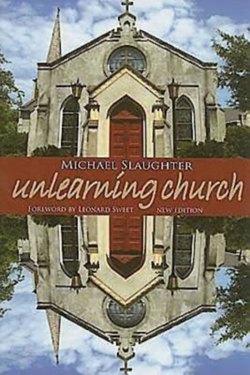Читать книгу UnLearning Church - Mike Slaughter - Страница 6
На сайте Литреса книга снята с продажи.
ОглавлениеWe hear and apprehend only that which we already half-know.
–Henry David Thoreau
Icame of age in a world that believed in "experts."
I grew up in an academic world that actually believed scholarship and scientific knowledge could solve all the problems of the world: poverty, racism, crime, and so forth. Just do good enough research, get all the facts together, write a paper that uses the scientific method to formulate a solution, submit the formula to peer review, and . . .
Presto! Problem solved.
Adolf Hitler called this the "rule of experts" or "Fuhrerprinzip," which literally means the right of superior minds to command unquestioning obedience and special treatment.
Fuhrerprinzip is finished. What killed the "rule of experts"?
First, the solutions that "experts" came up with often made the problems worse and/or created new problems.
Second, experts lied and lost trust. Two examples: In spite of reassurances from health experts and governmental sources, (a) eating contaminated beef really could cause "Mad Cow Disease" (BSE), and (b) the combined measles/mumps/rubella vaccine in Britain is now linked to a growing incidence of bowel disease and autism.
Third, scientific studies themselves demonstrate that the "common people," when given the right information and time to make conclusions, are "wiser" on social policy issues than social scientists and other "experts."
That's why I often begin my presentations with the disclaimer, "Don't take it from me."
In the modern world, "experts" asked us to "take it from me." Forget it. Don't take it from me. I boast no immaculate perceptions. Like everyone else, I see "through a glass, dimly." I know only "in part." All perception is smudged. There is in my life a large element of not-knowing.
I know just enough to know that I don't know as much as I should know. The people to fear are those who don't know enough to know that they don't know. Willard Quine, who some claim was the most important philosopher of the second half of the twentieth century, took all the "?" keys off his typewriters. He quipped that he didn't need them because he dealt in certainties.
Really, Mr. Quine!
I am like the seminary professor with the "80/20 rule": He claimed that 80 percent of his theology was right and 20 percent was wrong. He just didn't know which was which. I don't even agree with myself and some of the things I wrote ten years ago. Don't believe what I say because you believe me. You must know inside yourself that what I'm saying is true. All I'm doing is giving you a template for your use in testing your own experiences and observations.
One person paid me the ultimate compliment: "Dr. Sweet, this is the fourth time I've heard you. You certainly are interesting. But I'm going to tell you something. You never tell me anything I don't already know, but until you say it, I don't know I know it."
Don't take it from me.
If what I'm saying doesn't ring true in your soul or ring a bell in your brain, I could be wrong. That could be my 20 percent. Of course, that could also be your 20 percent. Either way, we need to check each other and test the Spirit.
Don't take it from Mike Slaughter either.
If you don't already know inside that what Mike is saying is true . . .
If, as you're reading what follows, you aren't saying, "Hey, I already knew that—I just didn't have the words for it . . ."
If Mike is not saying things here that you've already felt deep inside but not brought to consciousness . . .
If this book doesn't illuminate what you think but didn't know you thought until you read it here . . .
Then don't take it from Mike.
But if, as you read this book, you find yourself saying over and over again, as I did, "Oh, I see . . . I see . . ."
If God is giving us flashes of insight: "Aha . . . Amen . . ."
If God is opening in us an awareness of "that's right . . . of course . . ."
Then we're not taking it from Mike.
We're taking it from the Spirit.
The Holy Spirit is resonating with both our spirits and Mike's spirit to move us from belief to faith, from "ought" and "should" to "must." Besides, as Mike is the first to tell us, it's not about him anyway. It's all about Jesus and his "must" claims in our lives.
UnLearning Church is a "must" book for church leaders.
Leonard Sweet
E. Stanley Jones Professor of Evangelism
Drew Theological School
Madison, New Jersey
www.LeonardSweet.com
